Global compliance in outsourcing: Navigating regulations
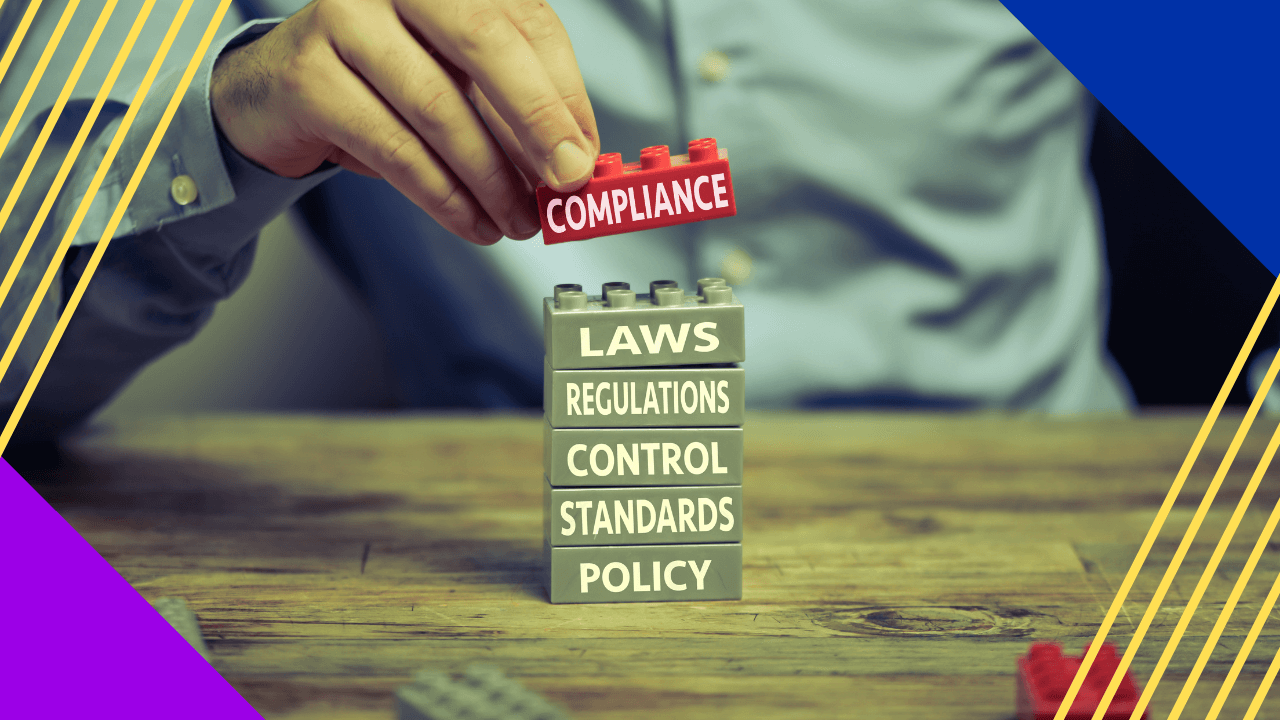
Have you ever felt you are tiptoeing through a regulatory minefield on outsourcing? You’re not alone. Many can agree that the globalized nature of outsourcing brings a myriad of compliance challenges. In this article, we will provide a clear roadmap to overcome the global compliance challenges in outsourcing.
We will discuss the major global regulatory frameworks available to help businesses assess and manage potential risks associated with outsourcing. We also include country-specific regulations and real-world examples to help companies develop and implement more proactive measures.
By the end of this read, you won’t just have compliance knowledge – you’ll possess a strategic toolkit. Ensuring your outsourcing endeavors meet regulatory standards and give your business a competitive edge. Let’s begin.
Understanding global compliance, best practices, & implications
Global compliance refers to the international standards, rules, and guidelines businesses and outsourcing partners need to follow. It ensures they can operate lawfully and ethically in the countries they want to operate, outsource operations, or provide services. It also maintains the safety of staff, customers, clients, and stakeholders.
Global compliance covers a wide range of areas, and we’re here to guide you through every layer.
I. Labor & employment regulations
One advantage of having an outsourcing partner is gaining access to the global talent pool. If you have specialized skills and expertise that are not readily available in-house, they can provide them. Once they do, comply with all the local and international labor laws and regulatory compliance practices. This ensures companies respect employees’ rights and treat them fairly and ethically.
Coca-Cola is one organization that sets a good example. Their workplace rights implementation guide covers labor laws and standards they comply with to uphold the employees’ well-being.
The company also complies with safety and health laws, regulations, and internal requirements. This helps them, as an employer, to provide a secure, healthy, and productive workplace.
Before entering a partnership, verify if your chosen outsourcing company observes labor laws and ethical sourcing practices. Are they providing reasonable working hours, sick leaves, and fair wages? Reviewing the outsourcing company’s labor policies and employee handbooks is one way to verify. You can also request their compliance certifications, such as:
- Fair Trade certification
- Carbon Trust Standard
- Fair Labor Association (FLA) Accreditation
- SA8000 (Social Accountability International Standard)
- ISO 45001 (Occupational Health and Safety Management System)
Best practices: Create joint policies
Outsourcing partners represent your brand globally. So, your business must align with them in every aspect. You can create joint policies to ensure they share your commitment to upholding high standards.
Joint policies will clearly outline the legal and ethical standards expected from both parties. It may include security measures, data privacy, and other industry-specific norms. You can also create business assessments to set clear expectations. The assessments cover the deliverables, quality of work, performance standards, and even candidate-job matching.
Use centralized document repositories to house all the joint policies. You can store it in cloud-based document management systems (DMS), compliance management systems, or build a knowledge management system on your shared collaboration platform. It makes it more accessible and easier to share. Here are 2 excellent options:
OnlyOffice
Is an excellent choice for DMS because you can collaborate with your outsourcing partners on various documents. It provides 5 editors (document editor, spreadsheet editor as an alternative to Microsoft Excel, presentation editor to make presentations, fillable forms, and PDF editor), and they are all secure. This software complies with international security standards and includes 3 levels of encryption.
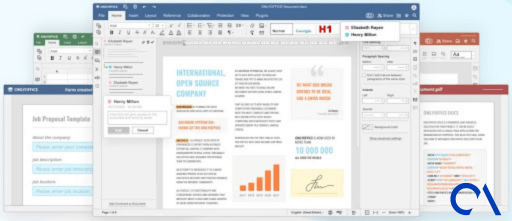
Tettra
Is your go-to option for knowledge base and management software. You can create a knowledge base through its simple editor or Google Docs file. It also uses AI to instantly answer your employees’ questions through the app or Slack.
If these options don’t make the cut, you can always find OnlyOffice and Tettra alternatives. You can find a knowledge base platform that matches your team’s purpose and size. When exploring alternatives, make sure to also consider the following:
- Search functionality
- Collaboration features
- Customization options
- Interface’s user-friendliness
- Access Controls and Security
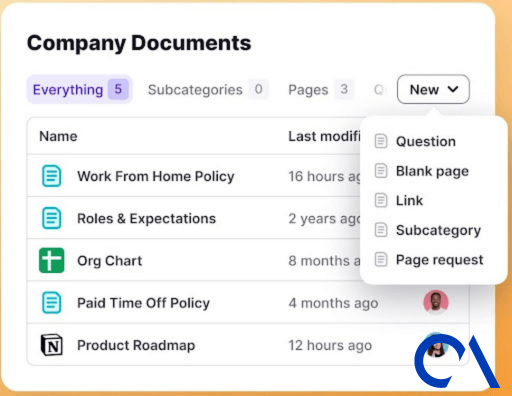
II. Data protection & privacy laws
Each country has its own Data Protection Authorities (DPAs). Their main responsibility is supervising how businesses collect, process, store, use, and transfer personal data. They can impose penalties on companies that fail to meet their required standards.
Most global DPAs demand that businesses include a privacy policy on their websites or apps. The exact content of the privacy policy will depend on the nature of the business and legal jurisdictions (home country and target market region). You can start with a general privacy policy if you meet any of the following requirements:
- Data collection has minimal impact on users
- Collects basic information (ex., name and email)
- No interactive features are available on the website
- Doesn’t use third-party services that collect additional user data
- The website does not require account creation or registration for users
Sokisahtel OÜ’s Sockdrawer, a modern design hosiery and socks seller, serves as a great example. It only provides a general privacy policy because it only asks for basic details on its account registration. They also use those details for communication, risk prevention, and invoice creation. Lastly, they do not use third-party services because they only collect information through their website.
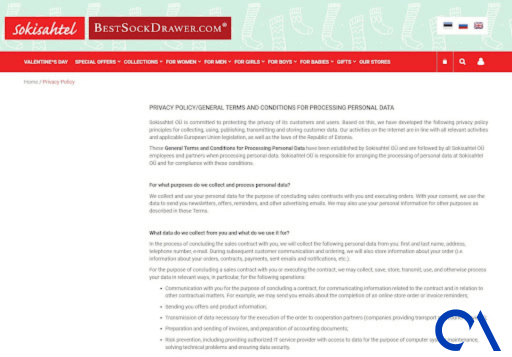
Sokisahtel OÜ provides a general privacy policy, but they ensure to include consumers’ most common concerns, such as:
- How long will we keep your data?
- When will we ask you for consent?
- Who else has access to your data?
- In what other ways can we use your data?
However, data privacy legislations (i.e., GDPR and CPRA) legally obligate business owners to include a more detailed privacy policy if they operate a website, desktop app, and mobile app. eCommerce is one industry required to add this kind of privacy policy in all of their platforms. Shop Solar, a complete solar and storage solutions provider, is a great example.
Aside from the standard information, they also describe how they will use personal information in their marketing campaigns and communications. With this practice, Shop Solar should comply with the California Online Privacy Protection Act (CalOPPA) to provide users with an opt-out option. They provide this with a notice of the right to opt-out and a link where they can make the opt-out request.
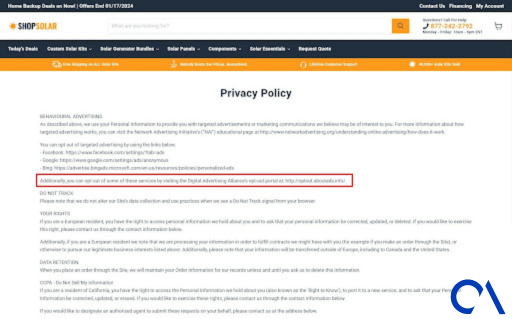
Shop Solar also complies with the General Data Protection Regulation (GDPR) because it offers goods and services within the European Union. They focused their notice on data sharing outside the European Union, Canada, and the U.S.
Best practice: Always add children’s online privacy protection notice
Everyone has access to the internet nowadays, including minors. That’s why data privacy legislations like GDPR and COPPA obligate business owners to inform parents and guardians about their practices. They can tell them with a direct notice placed prominently on the homepage, landing page, or locations where they collect personal information.
Regarding the notice, there is no specific format. MedicalAlertBuyersGuide.org, for example, provides a simple explanation that their services solely address persons age 18 and older. Specifically to the elderly because their service revolves mainly around researching and comparing personal emergency response systems. They sometimes share tips (travel and lifestyle). But still, these are intended for anyone moving into older age and AARP members.
They encourage parents and guardians to contact them if their children unknowingly provide them with their personal information. They will remove it from their servers as soon as they receive it.
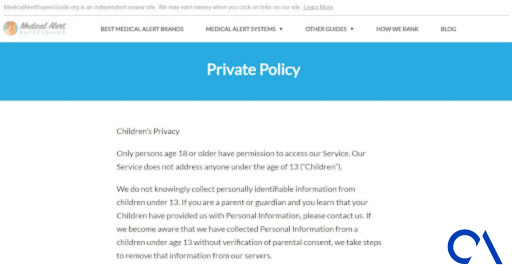
III. International financial & tax compliance
Making smart financial decisions is crucial to supply chain operations. Start learning your home country’s financial and tax systems and outsourcing destination to identify opportunities and mitigate compliance risks. Here are the elements you should know about:
- Processes
- Filing due dates
- Withholding tax considerations (coordinate with tax authorities)
- Tax compliance requirements (i.e., corporate income tax, value-added tax)
- Forms and documents (i.e., financial statements, transfer pricing documentation)
We recommend coordinating with your outsourcing partners. You can discuss policies and procedures that you both must follow and establish an effective planning process. Financial and tax compliance is not only a legal obligation. It’s an excellent strategy to manage risks and take advantage of available incentives, credits, and deductions.
The latter will have a fruitful impact on your bottom line, generating significant revenue. However, you should understand the credits and incentive availability in different jurisdictions. You should also stay up-to-date with the latest changes in tax laws.
Non-compliance and you will face the same fate as Apple Inc. (Apple State Aid Case). After someone accused the company of receiving illegal tax breaks in Ireland, it came under scrutiny. Though the European Central Court overturned the 2016 decision in 2020, Apple Inc. still suffered a massive setback in its battle. If they lose the tax case, they must pay more than 13 billion euros worth of back taxes.
Best practice: Do proper documentation
Tax filings involve many financial records, transactional data, and different forms. Businesses should maintain accurate and complete documentation. This ensures you won’t miss anything important. Documentation is also handy for:
- Audit trails
- Dispute resolution
- Serve as evidence in legal proceedings
- Continuous improvement (performance metrics and feedback loops)
It can also help you see if the outsourcing arrangement aligns with your home country’s applicable standards and regulations. This provides the necessary insights to manage global compliance. With this level of transparency, each party can immediately see if one party is committing fraud.
IV. Service & product standards
Service and product standards consist of guidelines and criteria to guarantee reliability in various aspects of delivery, performance, and quality. When services and products consistently meet (or even exceed) these established standards, it reinforces positive experiences for customers.
It also helps business owners create a baseline. Business owners will use this performance baseline to immediately identify areas that work and need improvements.
The International Organization for Standardization (ISO) is the most common entity that enforces service and product standards. It assures consumers that the services and products are safe to use, reliable, and high quality. Its standards are grouped based on the purpose or industry they serve.
- ISO 13485: Medical devices industry
- ISO 37001: Prevent, detect, and address bribery
- ISO 50001: Development of an energy management system (EnMS)
- Foreign Corrupt Practices Act: Compliance with anti-corruption laws
- ISO/IEC 17025: Testing, sampling, or calibration of all types of laboratories
Some products or services can cause injury or death. The Consumer Product Safety Commission (CPSC) protects the public from these risks. Aside from their own regulations, they also cover various statutes to strengthen their consumers’ protection.
a. Consumer product safety ACT (CPSA)
Authorize the agency (CPSC) to ban products that may or will cause harm and pursue recalls.
b. Refrigerator safety act (RSA)
Requires manufacturers to install a door mechanism on refrigerators, allowing the door to open from the inside.
c. Labeling of hazardous art materials act (LHAMA)
Mandates that all art materials that have the potential to cause chronic health hazards must bear a warning label.
Best practices: Evaluate suppliers & vendors using product & service standards
Business owners make product and service standards a vital criterion in selecting suppliers and vendors. This strategic approach helps them choose partners who uphold similar high standards of quality and safety in their products and services.
Clear communication facilitates smoother interactions between business owners, suppliers, and vendors. It makes it easier for business owners to give their expectations and specific quality requirements to suppliers and vendors. They can also use it to provide performance feedback.
Some suppliers and vendors use communication channels to share the specific global compliance laws and legislation they apply to their operations. But some, like Vivion, also use its website’s product pages to share their compliance information.
Vivion is a reputable wholesale supplier of quality ingredients. They combine all their compliance documents into one file to show their commitment to ethical business practices. One example is its Calcium Carbonate product page.
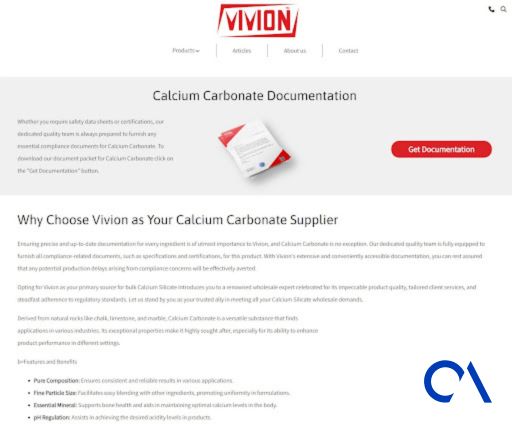
Below the product’s specifications, you will find the prepared document ready for download. Click the “Get Documentation” button and fill in your name and email. They will send it to you right after. Some suppliers use their order forms and include compliance information as fine print.
You can also include it in the order form. Create custom order forms and write your compliance information in fine print. Add the agency’s logo to make it simpler and easy to read.

Outsourcing & compliance trends to watch in 2024
Stay current with industry trends to ensure your outsourcing activities meet the latest compliance requirements. We compiled the highlights in outsourcing statistics. This will help you redesign your global outsourcing initiatives.
1. It outsourcing market
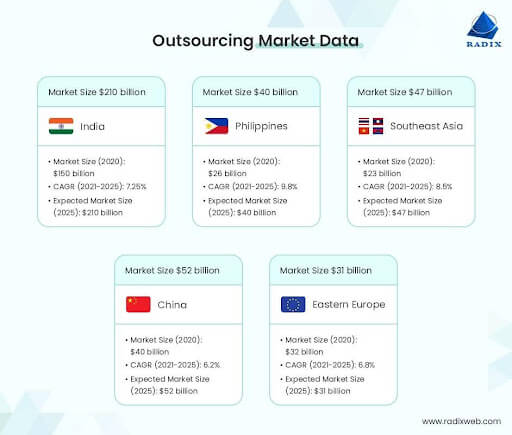
Information Technology (IT) remains the top market to outsource in 2024. The reason lies in the continuous evolution of artificial intelligence (AI), robotic process automation (RPA), and cloud technology. Today, most corporate online platforms and business intelligence (BI) tools use multiple technologies to provide exemplary results.
Consider a metrics intelligence platform, for example. Today, data has become the most valuable business asset for making informed decisions. So, companies find immense value in adopting this reliable tool. A metrics intelligence platform uses various technologies to capture, analyze, and translate the output into digestible information.
A. Encryption, access control, etc.
Security technologies to protect the data.
B. Big data frameworks
Handle the processing and analysis of large datasets.
C. Data warehouses or cloud-based storage solutions
Store large volumes of structured and unstructured data.
D. Extract, Transform, Load (ETL) tools
Integrating data from various sources and transforming them into a standard format.
Regulations for AI use
Since AI’s usage skyrocketed in recent years, legislation is still under development. Only in 2023 did the EU Council and Parliament reach a provisional agreement (The AI Act proposal) to regulate the usage of AI. Though the European Parliament will vote on it in early 2024, it will still take effect in 2025.
One country’s legislation is different from others. Check your home country and outsourcing destination to learn the AI-focused regulations they impose. Here are the important elements that you should look for in the compliance obligations:
- Security
- Fairness
- Accuracy
- Accountability
- Transparency
2. Dropshipping market
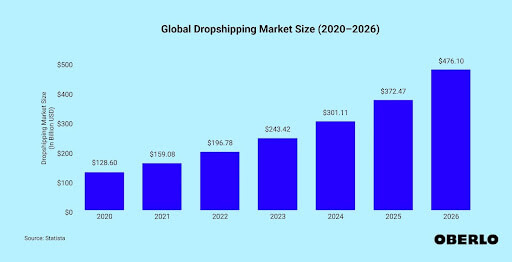
The dropshipping market is growing and is forecasted to reach its worth of up to $301.11 billion in 2024. That’s why it has become one of the most popular business models in recent years. But before adopting this business model, consider key factors to ensure success.
Conducting thorough market research is the first step. Here, you can identify the profitable niches with sufficient demand and manageable competition. Once you select one, you can start searching for suppliers.
Ensure you look for dropshipping suppliers with a track record of consistent product quality, timely shipping, and worldwide service. They should also show proof of compliance with various trading laws. Lastly, select dropshipping suppliers compatible with various Ecommerce platforms software for easy integration.
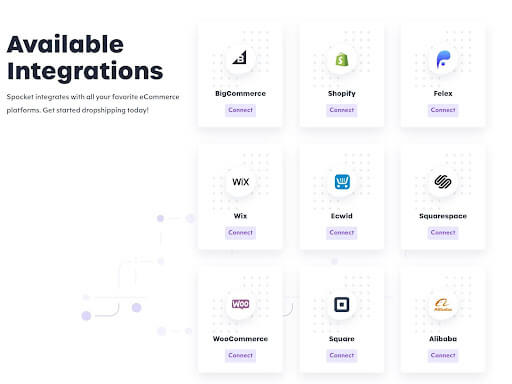
Remember to monitor the market trends. It helps you update your product offers to meet the latest customer preferences. Invest in a user-friendly eCommerce platform. Ensure your website is easy to navigate, with clear product descriptions and high-quality images.
Regulations for dropshipping
Like most business models, dropshipping businesses should get a business license. This makes it easier to file taxes and prove the business’s legitimacy. They should also comply with the applicable law of the country they’re providing products to. Let’s say you’re dropshipping in New Zealand; you need to abide by its trading law, which includes:
- Privacy
- Fair trading
- Consumer guarantees
If you’re in the U.S., you should abide by copyright, email marketing software (CAN-SPAM Act), and licensing laws. There’s more regulatory compliance to comply with depending on the state where you operate.
3. Combating anti-money laundering & counter-terrorism financing
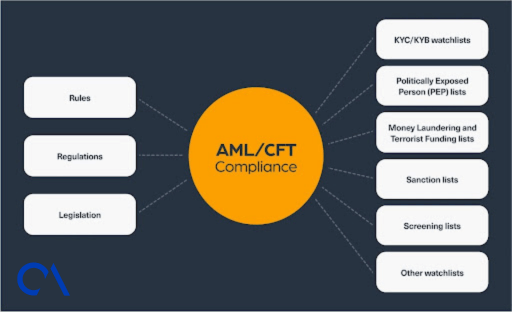
Like most businesses, outsourcing companies can be defenseless against anti-money laundering and counter-terrorism financing risks. Make sure to adopt proactive measures and consider the following aspects:
i. Security risk
Outsourcing partners should prioritize data security and confidentiality.
ii. Third-party risk
If outsourcing partners rely on third-party service providers, verify anti-money laundering and counter-terrorism financing controls in place.
iii. Continuous employee training
All employees involved in anti-money laundering and counter-terrorism financing processes should receive the necessary compliance training courses and certifications.
iv. Incident response plan
Create a well-defined plan that fully describes the impact of potential incidents, reports to regulatory authorities, and demonstrates a commitment to rectifying issues.
v. Contractual agreements
All written agreements should clearly outline the responsibilities of the outsourcing company and the service provider. This includes the scope of services, reporting requirements, and adherence to regulatory standards.
Conclusion
As your businesses expand across borders, understand and adhere to diverse regulatory frameworks in other countries. It will help you avoid problems and keep the operation running smoothly. Of course, you should also conduct due diligence in your home country.
When complying with your home country’s laws and ethical standards, check if there are local laws that extend to extraterritorially. Extraterritorial laws uphold specific ethical standards. They do so even when you’re operating in locations with different cultural or legal norms. But it can also pose jurisdictional challenges. Verify if it has potential conflicts with international laws or not to be safe.
Are you looking for a reliable outsourcing platform that can help you optimize your outsourcing strategy? Let Outsource Accelerator assist you. We can help you streamline operations, ensure compliance, and maximize operational efficiency.







 Independent
Independent




